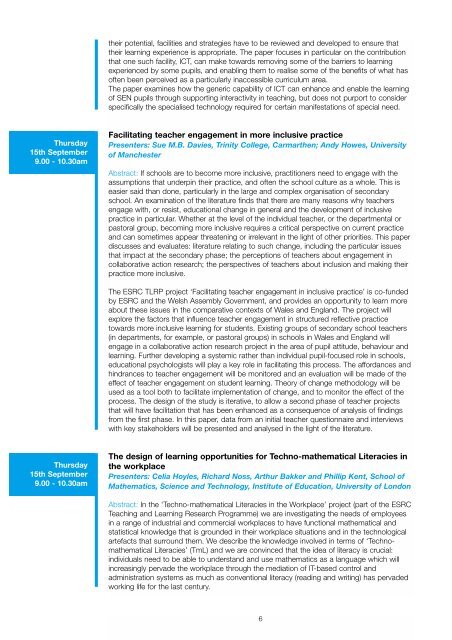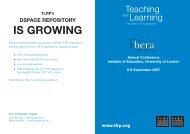Bera Booklet 2005 - Teaching and Learning Research Programme
Bera Booklet 2005 - Teaching and Learning Research Programme
Bera Booklet 2005 - Teaching and Learning Research Programme
- No tags were found...
Create successful ePaper yourself
Turn your PDF publications into a flip-book with our unique Google optimized e-Paper software.
their potential, facilities <strong>and</strong> strategies have to be reviewed <strong>and</strong> developed to ensure thattheir learning experience is appropriate. The paper focuses in particular on the contributionthat one such facility, ICT, can make towards removing some of the barriers to learningexperienced by some pupils, <strong>and</strong> enabling them to realise some of the benefits of what hasoften been perceived as a particularly inaccessible curriculum area.The paper examines how the generic capability of ICT can enhance <strong>and</strong> enable the learningof SEN pupils through supporting interactivity in teaching, but does not purport to considerspecifically the specialised technology required for certain manifestations of special need.Thursday15th September9.00 - 10.30amFacilitating teacher engagement in more inclusive practicePresenters: Sue M.B. Davies, Trinity College, Carmarthen; Andy Howes, Universityof ManchesterAbstract: If schools are to become more inclusive, practitioners need to engage with theassumptions that underpin their practice, <strong>and</strong> often the school culture as a whole. This iseasier said than done, particularly in the large <strong>and</strong> complex organisation of secondaryschool. An examination of the literature finds that there are many reasons why teachersengage with, or resist, educational change in general <strong>and</strong> the development of inclusivepractice in particular. Whether at the level of the individual teacher, or the departmental orpastoral group, becoming more inclusive requires a critical perspective on current practice<strong>and</strong> can sometimes appear threatening or irrelevant in the light of other priorities. This paperdiscusses <strong>and</strong> evaluates: literature relating to such change, including the particular issuesthat impact at the secondary phase; the perceptions of teachers about engagement incollaborative action research; the perspectives of teachers about inclusion <strong>and</strong> making theirpractice more inclusive.The ESRC TLRP project ‘Facilitating teacher engagement in inclusive practice’ is co-fundedby ESRC <strong>and</strong> the Welsh Assembly Government, <strong>and</strong> provides an opportunity to learn moreabout these issues in the comparative contexts of Wales <strong>and</strong> Engl<strong>and</strong>. The project willexplore the factors that influence teacher engagement in structured reflective practicetowards more inclusive learning for students. Existing groups of secondary school teachers(in departments, for example, or pastoral groups) in schools in Wales <strong>and</strong> Engl<strong>and</strong> willengage in a collaborative action research project in the area of pupil attitude, behaviour <strong>and</strong>learning. Further developing a systemic rather than individual pupil-focused role in schools,educational psychologists will play a key role in facilitating this process. The affordances <strong>and</strong>hindrances to teacher engagement will be monitored <strong>and</strong> an evaluation will be made of theeffect of teacher engagement on student learning. Theory of change methodology will beused as a tool both to facilitate implementation of change, <strong>and</strong> to monitor the effect of theprocess. The design of the study is iterative, to allow a second phase of teacher projectsthat will have facilitation that has been enhanced as a consequence of analysis of findingsfrom the first phase. In this paper, data from an initial teacher questionnaire <strong>and</strong> interviewswith key stakeholders will be presented <strong>and</strong> analysed in the light of the literature.Thursday15th September9.00 - 10.30amThe design of learning opportunities for Techno-mathematical Literacies inthe workplacePresenters: Celia Hoyles, Richard Noss, Arthur Bakker <strong>and</strong> Phillip Kent, School ofMathematics, Science <strong>and</strong> Technology, Institute of Education, University of LondonAbstract: In the ‘Techno-mathematical Literacies in the Workplace’ project (part of the ESRC<strong>Teaching</strong> <strong>and</strong> <strong>Learning</strong> <strong>Research</strong> <strong>Programme</strong>) we are investigating the needs of employeesin a range of industrial <strong>and</strong> commercial workplaces to have functional mathematical <strong>and</strong>statistical knowledge that is grounded in their workplace situations <strong>and</strong> in the technologicalartefacts that surround them. We describe the knowledge involved in terms of ‘TechnomathematicalLiteracies’ (TmL) <strong>and</strong> we are convinced that the idea of literacy is crucial:individuals need to be able to underst<strong>and</strong> <strong>and</strong> use mathematics as a language which willincreasingly pervade the workplace through the mediation of IT-based control <strong>and</strong>administration systems as much as conventional literacy (reading <strong>and</strong> writing) has pervadedworking life for the last century.6
















